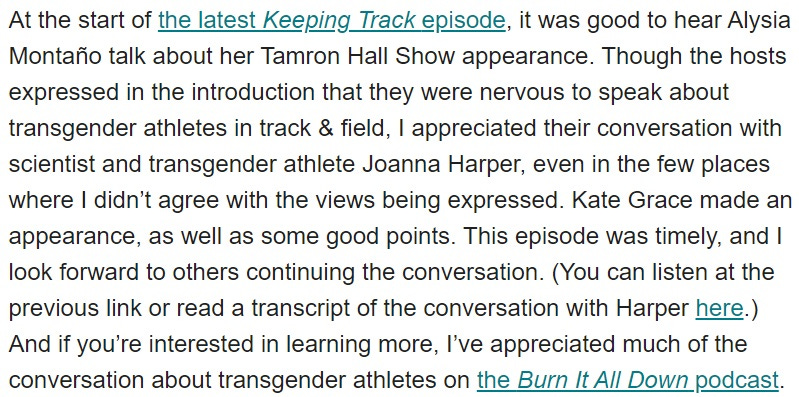Keeping Track takes a tentative but solid step toward equalizing the sports-gender conversation
Yes, we* need frank discussions about DSD and trans athletes–with the accepted rules of dialogue, not those imposed by yammering zealots
Keeping Track, a podcast hosted by current and former world-class runners Molly Huddle, Alysia Montaño and Roisin McGettigan, recently featured physicist, former 2:23 marathoner, and transgender woman Joanna Harper as a guest. Kate Grace, a 2016 U.S. Olympian in the 800 meters with a personal record of 1:58.10 whose name makes a great case for spoonerisms, was on hand as well. With Harper’s lived experiences and scientific expertise guiding the way, the women discussed the terms “transgender” and “intersex,” the differences between these concepts, and the impact of trans and intersex athletes on girls’ and women’s sports. (Pointless nut germane arcana: When I took astrophysics in college in 1991, my professor was also a transgender woman with a doctorate in physics named Joanna.)
Although the issue of male physical bodies appearing on non-male sports rosters in track and other sports has sparked a series ever-more-contentious opinion pieces over the past five-ish years—most of these centering on Caster Semenya, the intersex athlete who was ultimately disallowed (albeit two Olympics too late) from participating in the women’s 800 meters—the cohort most loath to publicly explore the matter is the one whose members have been most conspicuously affected by the inclusion of testes (or when you get right down to it, the chemical output of those dismal glands) in women’s athletics: Professional middle-distance runners.
While I may at times appear to aspire to live on a planet where everyone always cuts to the chase and throws everything into the open, however delicate, so that society can resolve the problem in question and move ahead like soulless droids, I don’t blame this small group of runners one bit for their reticence—and I felt the same way well before SJWs1 were anywhere close to their present level of odium and virulence. The last time someone from the pro ranks opined to the press that having someone with functional testes in women’s Olympic events seemed kind of unfair, she drew vicious opprobrium, none of it on point, from Caster Semenya’s irate, blinkered fans. Other world-class mid-distance women noticed the death threats and other wretchedness thrown Lynsey Sharp’s way, and have unhelpfully but wisely kept quiet on the matter since.
Remember this episode whenever you see people whining about the supposed bully tactics of cis women or anyone who disputes that the insanity represented by Semenya should continue.
Because “sports gender” is one of many topics I see the media now intentionally deforming in every important way, especially the left-dominated running media, I’m using this post exclusively to provide background on how a subject that was always bound to be challenging to resolve in any scenario has become impossible to even approach rationally thanks to the impressively shrill, intimidating, and gutless maneuvers of social-justice warriors*, or wokesters, or whatever unflattering label you prefer. Next time, I will comment on the Keeping Track presentation’s salient points. My breaking this into two parts will also give you a chance to listen to the podcast yourself or at least do me the solid of memorizing the transcript notes before reading my take on it.
The ugly response to Sharp’s completely understandable distress typifies, and in fact defines, how SJWs behave: They decide which side in any kind of conflict is right—that would be theirs—and then set about ensuring that the other side’s opinion is not only dismissed on the basis of pathological ignorance or ill intent, but also suppressed to the extent possible. This is true regardless of the oppressional area of focus; while some SJWs prefer to lie and bully primarily on behalf of non-binary and transgender people, others specialize in anti-racism or “anti-racialism,” while still others direct the bulk of their efforts at “fatphobia.” Not surprisingly, it’s become common for the more ambitious ones to flit like dung-flies between multiple social realms.
Regardless, “social justice” to this crowd has nothing to do with justice for anyone. It is illiberal. It means universal and unconditional assent—often with brazenly wrongheaded ideas, but that’s only part of its malevolence. It is incoherent, often demanding contradictory norms, e.g., elevating a “body politics” goon on one side while blaring “No body talk at all!” on another. It is a swarm of competing narcissisms; it is amazingly, proudly, explosively stupid. It is also—as anything with the aforementioned traits would have to be to get off the ground—amazingly arrogant, reliant on the surreal defiance of reality itself to achieve momentum. Like this “Quadrilateral squares are circular squares”-style declaration by a prominent ACLU attorney, among TIME Magazine’s 100 most influential people of 2020:
Chase Strangio could reasonably be suspected of being, say, an arch-libertarian out to destroy the ACLU from within or an overly bored gamer with a J.D., but I suspect he’s just an ass, not that there is much moral daylight between these categories. Even for a lawyer—even worse, an activist lawyer, like any number of instantly infamous John Grisham characters—he rates among the most obnoxious and dishonest Twitter users I’ve ever seen with cancellable professional standing of their own to consider. A civil-liberties lawyer trying to stop the publication of a book because he doesn’t like the arguments? He should know he’s fully entitled to the second thing, but not the first.
In any in-person verbal interaction, most people like Strangio would prove themselves cowards or at least unable to hijack the conversation using appeals to emotion and the fraught, garbled nonsense they can be counted upon to blurt out even unprovoked—and retract ad libitum—on social media. In fact, if the behavior of transgender and intersex people mirrored that of their de facto public-relations crew on Twitter, which I thankfully know to be far from the case, I’d root unconditionally against them in every sector of life; I’d be ill-advised not to, since, even now, if I were on the radar of Strangio or any other cancel-happy critters of influence, they’d likely try to keep me from writing what I do here. As it is, multiple people associated with my past identity as a writer for running publications have already tried to coerce me in one way or another into quitting this enterprise. I wish I could clone my sorry ass so I could double this blog’s weekly word count.
No matter your stance, you should be prepared to admit how grisly it is that the American Civil Liberties Union now has among its most prominent voices a frenetically anti-free-speech agitator. But this reality is one of the many and rapidly multiplying reasons I see responding to these scoundrels as urgent. This is a complete transformation of an accepted norm, and it’s of a piece with all the anti-journalism journalists whose numbers appear to be similarly multiplying.
Read any of the stories you can unearth about Semenya or the issue of transgender girls in high-school sports published outside of, say, Breitbart or Fox News, and you won’t see what you should see in any well-reported story, including op-eds: A factual presentation of the entire argument, followed by reasons a reader should be persuaded into your own—in this case, the “let trans and intersex girls women compete with biological girls” position. Instead, they relentlessly push the idea that all opposition to what appears to be an obvious problem to most Americans is rooted in anti-trans bigotry or hate or misunderstanding or—my own favorite—antiquated science.
I could call upon any one of literally two dozen misleading pieces I’ve bookmarked or read about Semenya alone just since 2016; Letsrun.com covered some of them in late 2019, but Robert Johnson’s list was incomplete when he made it and has been rendered almost obsolete by the gluck that’s been roaring out the SJW sewer-main since then. This story by longtime New York Times pablum-machine Gina Kolata is one of the more harmless ones, but the headline tells all: You should still have doubts. Anyone who does in fact dispute the role of testosterone in sports and in the body, which is what the Times editors have done here, is a crank deserving of all the derision someone would get if they proposed doping be allowed on the basis of androgenic steroids having no demonstrated performance-boosting effects. The whole strategy is bellowing falsehoods in people’s faces and then spitting at them when they try to argue, however politely.
Although the Times is now an openly low-quality enterprise, even a joke, its contributions retain a veneer of authenticity, if only because of the paper’s now-long-expired reputation. Related columns in other outlets have, more often, been unreservedly inane, like this one (“right to exist” has become a popular term, especially in pieces asserting racism, as if people want Semenya to actually vanish rather than experience restrictions on her ability to poach Olympic medals). An astounding number of these stories use the term “naturally elevated testosterone,” which in some cases is clearly the result of active dissembling about Semenya’s anatomy but in others seems to represent genuine befuddlement about where all of that testosterone is coming from.
All in all, this group of contributors should be extremely embarrassed about every word they’ve produced on the subject. But if they had the capacity to face their mistakes or any interest in doing their jobs with integrity, they’d be different people altogether.
Photo credit: Daniel Zuchnic/Filmmagic
Taken together, these voices represent a brand of religious wacko that’s worse than any of the traditional kinds, because, in addition to lying about everything of consequence, they’re harder to hide from and have gained significant control of some of the country’s institutions. This is especially true of colleges and universities, where people with doctorates eagerly and consciously promote things they know to be both false and destructive, but the slide into lunacy is also already having a major impact on corporations and workplaces beyond media. These cretins don’t have to come knocking at your door, because chances are good that they are already somewhere within your “house” as it is. I detest their work, especially the ones well-paid to knowingly prevaricate; I’m finding it harder and harder to pretend otherwise and exercise any kind of restraint here, especially given the assurance that I have only decades to live.
Incidentally, I found out about the Keeping Track podcast—the whole production, not just this episode—from the February 1 edition of the Fast-Women newsletter, which included this blurb near the bottom:
This was near the bottom of the newsletter, where Alison Wade reliably sticks the more static-laden topics she wants to mention or link to as silently as possible. (In a previous issue, she declared, “Ben Chan was great on Emma Zimmerman’s Social Sport podcast,” which could only have been true from the standpoint of someone who despises Ben Chan and revels in his public flailing.
Whenever I see this kind of agonizingly bloodless, borderline pointless summary about a controversial subject, I’m tempted to ask myself why the heck anyone would claim to care about an important matter if they’re not willing to affirm—in a widely distributed and reader-supported newsletter—their own position on that matter, or at least identify specific points others have made, even if they’re loath to say whether they agree or not. But I’ve gotten used to seeing this as part of a whole cycle of SJW cowardice: Be adamant that people be informed of a position you favor, but let someone else do the work of saying it. If people are going to pay me even ten cents a month on the penny to do this, I feel like I owe them more than “Opinions were had, some were bad, but nice effort all around” and a bevy of weblinks.
My suspicion is that Wade reckons she needs to remain inside a narrow set of lines here; even though it’s plain where she stands on the issue of trans girls and women in sports, she probably reckons it runs against the grain of the prevailing thinking of the elite mid-distance and other women athletes she so often writes about and interviews. If this is the case, I’d bet my life, along with every one of yours, that she is correct.
Most of the displeasure I’ve expressed before today with the way the media has handled this topic has, I think, focused on basic journalistic miscues, e.g., factual errors, misleading statements and glaring omissions. But I can’t stress enough the only thing that I find truly infuriating about this is the conspicuous manner in which pro-trans SJWs try to muzzle anyone with significant reach who disagrees with them in any way, on any grounds. Advocacy, even if misguided, can still be conducted in earnest. But this crap—though cowardly, transparent, and dumb—is actually the only strategy that anyone whose sole argumentative weapon is propaganda can even try. It is exactly what fundamentalist Christians do when making their own contrarian noises about things for which they have no evidence-based opposition, be it evolutionary biology or same-sex intimate relations: They assert victimhood and deflect factually ironclad arguments against their positions with silliness—in the case of the Christian, claims about scientists “hating God,” breathless lies about deathbed recantations by Charles Darwin, and so on.
When white Christians do this, however, or complain of non-threats such as “wars on Christmas,” it’s easy to see the flimsiness of this since most Americans are some combination of white and Christian. But although the lies from SJW types are often just as undisguised—e.g., claims like ”testosterone may not benefit athletic performance” and other plainly whimsical assertions—they’re usually made on behalf of people most observers instinctively and correctly regard as being targets of excessive nastiness or discrimination. As a result, they can more easily frame their bleating as substantive complaints than can the cross-brandishers.
The hosts’ own summary of the episode (which you can listen to here, while the transcript is here) is “Joanna Harper walks us through Sporting Gender, and we discuss the reckoning of the human rights side of the issue of including Trans and DSD women in sport vs the intricacies of the sports physiology involved.” I read this as “Should female sports expand to include intersex women, transgender women or both? We explore the human-rights and physiological aspects with transgender athlete, scientist and policy consultant Joanna Harper.” And that’s what Huddle, Montaño and McGettigan did. Later this week, assuming I’m still alive and free, I’ll turn out a review of what they said and what the hosts appeared to have picked up from Harper’s input.
As I’ve mentioned before, a social-justice warrior (SJW) is a troublemaker, usually a grandstanding one, who uses Internet pile-ons and similarly malignant cancellation-oriented tactics to try to “win” an argument that cannot be secured by facts or reason. They are basically terrorists within the exchange-of-ideas sphere.





